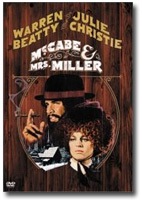Movies |
McCabe & Mrs. Miller
directed by Robert Altman
By
Published: Jun 30, 2021
Category:
Drama
Robert Altman liked to say he hated Westerns. He didn’t much enjoy working with Warren Beatty. He was silent about directing Julie Christie. He probably disliked her too.
But in the winter of 1970, Altman took Beatty and Christie to the Pacific Northwest and made what the AFI has listed as the 8th best Western ever.
Well, not exactly a Western as you may think of it: John Ford, John Wayne, Clint Eastwood.
In 1970, our President was a crook, we were locked in an Asian war we could not win, our kids were growing their hair long, smoking weed and fornicating in the stairwells.
With that going on, no way does Robert Altman make a traditional Western.
This movie is about much more than the plot, but here’s the plot: Warren Beatty (McCabe), a small-time gambler with more dreams than brains, comes to the tiny community of Presbyterian Church to open a bar and bordello. It is his great good fortune to run into Julie Christie (Mrs. Miller), an opium-smoking prostitute who actually knows how to run a whorehouse. They join forces, get successful, have an awkward romance. A corporation decides to buy them out. Christie’s in favor of the deal — she understands the power of Big Business — but Beatty fancies himself a negotiator. So the corporation dispatches three gunmen to kill him.
I was just out of college when “McCabe & Mrs. Miller” was released. I was a disciple of Leonard Cohen (whose early songs provide a gloomy, dreamy soundtrack). I admired Altman, respected Beatty, had a crush on Christie. My reaction to the film was predictable: It was one of the greater films I’d ever seen. [To rent the video stream from Amazon, click here.]
Watch the opening sequence and see if you don’t fall under its spell:
Most critics didn’t agree. Here’s Vincent Canby, of The New York Times: “The intentions of ‘McCabe & Mrs. Miller’ are…meddlesomely imposed on the film by tired symbolism, by a folk-song commentary on the soundtrack…and by metaphysically purposeful photography….Such intentions keep spoiling the fun of what might have been an uproarious frontier fable.”
Talk about wrong-headed! Canby wanted Altman to make another “M*A*S*H.” But Altman wanted to get inside a genre, to show that the West wasn’t Gary Cooper and John Wayne — it was just like now, with little people starting small enterprises and getting a town going, then the Big Boys muscling them out and sucking the soul from the community. The story of the hardware store and Wal-Mart.
But forget all of that. “McCabe & Mrs. Miller” is no more about its plot than your life is. It’s about dreams. And wanting to build something for yourself when you’re over your head and you don’t really know the players and all you have is you. And then it’s about taking the next step — gambling on love, on dreams. The Leonard Cohen lyric about the gambler says it all: “He’s just looking for a card so high and wild he’ll never have to deal another.”
And then it’s about weather. First drizzle, then snow. And as the snow blankets the town, the movie gets quieter and quieter. The climax is inevitable and dark; it’s played out in bright, silent snow. What ends badly also ends beautifully.
BONUS STORY, FROM LEONARD COHEN
I was living in Franklin, in Tennessee, and I’d come into Nashville just to see a movie–we’d been living out in the sticks for a long time. And I saw this movie called Brewster McCloud. Have you seen it? It’s a very, very beautiful and I would say brilliant film. I sat through it twice. Maybe I just hadn’t seen a movie in a long time, but it was really fine.
I was in the studio that night, in Nashville, and I got this call from a chap called Robert Altman. And he says, “Listen, you know, I love those songs, I’ve built a film around them, can I use them?” I said, “Who are you?” He said, “Well I, I did M*A*S*H, that’s my film.”
I said, “I know it was enormously successful, but I haven’t seen it. Is there anything else that you’ve done that I might know?” “Well, I did a picture that’s been completely buried, that you wouldn’t know about, it was called Brewster McCloud.”
I said, “Listen, I just came out of the theatre, I saw it twice, you can have anything of mine you want!”


